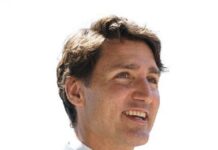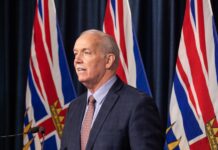BY IAN HOLLIDAY
Research Associate
Angus Reid Institute
WITH Alberta’s Progressive Conservative and Wildrose parties formally joining forces to become the United Conservative Party, the conventional wisdom is that the days of Premier Rachel Notley’s NDP government are numbered.
But a lot could happen in the roughly two years between now and the next provincial election in 2019. That’s more than enough time for Notley’s government to improve its standing with Albertans. It’s also enough time for other parties to emerge as potential spoilers. Speculation has already begun about challenges to the UCP’s dominance both to the right and to the left of the new party.
The first order of business will be for the United Conservatives to pick a permanent leader – someone to keep their provincial union together and growing the way former Prime Minister Stephen Harper did after uniting the federal Conservatives in 2003.
Candidates for UCP leader begin their campaigns with economic issues squarely at the top-of-mind for most Albertans, where they have been since before the NDP victory in 2015.
In the Angus Reid Institute’s most recent quarterly analysis of provincial politics – conducted June 5 – 12 by MARU/Matchbox, which donated the data to the Angus Reid Institute – respondents were asked to name the single most important issue facing their province. In Alberta, a full majority (56%) chose “the economy.” No other issue topped the list for more than 11 per cent of residents (perhaps worryingly for Notley, the second-most-chosen option is “leadership,” which rarely registers in provinces with popular premiers).

The denizens of Wild Rose Country are three times more likely to say their standard of living has worsened over the last year (41% do) than they are to say it has improved (14%; the remaining 43% say it has remained the same). Likewise, they’re tepid about whether their standard of living will improve over the next 12 months (20% say it will, but 26% say it will worsen; 47% say it will remain the same).
Albertans are bullish about the future of the provincial economy, however, and with good reason. In May, Canada experienced its fastest GDP growth in two decades, largely on the back of strong growth in the oil and gas sectors.
Some 44 per cent say the Alberta economy will improve over the next 12 months, compared to 31 per cent who say it will worsen and one-in-four (25%) who say it will stay the same. For context, it’s worth noting that in every other province except Saskatchewan, residents are more likely to think their provincial economy will worsen over the next year than to think it will improve:

*Note: Responses from Prince Edward Island not shown due to small sample size.
This optimism doesn’t reflect faith in the NDP government’s management of the economic file, however. Albertans are nearly twice as likely to say they are dissatisfied with the provincial government (61%) as to say they are satisfied (33%). On the provincial government’s handling of the economy, specifically, dissatisfaction rises to nearly three-quarters (74%).
What remains to be seen is whether the provincial economy continues to prove the optimists correct. And, if the economy does continue to improve, will Albertans see that as happening because of the NDP government’s efforts, or in spite of them?
Into this situation step the would-be leaders of the United Conservative Party. While other candidates will no-doubt announce campaigns to be leader of the fledgling party, the conventional wisdom is that the race is destined to be between the two men who guided their parties into the union – Progressive Conservative leader Jason Kenney and Wildrose leader Brian Jean.
If those are the two candidates, recent ARI analysis suggests that Jean begins the race with a slight edge in favourability. He had a marginally higher job approval rating as Wildrose leader than Kenney did as PC leader, and a lower disapproval rating, though it should be noted that both men were considerably more popular than Notley in ARI’s June analysis:

In a similar vein, Jean is more likely than Kenney to be seen as the provincial party leader best suited to deal with each of the issues canvassed in the survey, including the economy:

Indeed, on three issues – the environment, health care, and education – Kenney is running third, behind Notley as well as his conservative rival.
Of course, the relevance of these issues to Alberta voters is debatable. None of them come close to the level of importance Albertans attribute to the provincial economy, and it’s questionable as to whether the other issues are driving voting intention in the province today.

The slight advantage Jean enjoys on each of these issues may be a product of goodwill he has built up among right-leaning Albertans since taking over as Wildrose leader and leader of the opposition in 2015. While Kenney returned home recently, with the explicit goal of uniting the right and ousting the NDP, Jean has been “fighting the good fight” in Edmonton in the eyes of partisans for years.
Kenney is, of course, a familiar face for Albertans. He was arguably the most prominent Alberta MP in Stephen Harper’s cabinet other than the former PM himself. But Kenney hasn’t been in the legislature in Edmonton on a day-to-day basis during the Notley government the way Jean has.
That said, the largest group of responses on each of these questions is “not sure” – ranging from 29 per cent on the economy question to 35 per cent on crime. This suggests that there is significant room for Kenney, Notley, and even the leaders of other parties to state their cases to Albertans in the coming months.
It’s also notable that these responses come from all Albertans, not from party members. Jean’s higher favourability with the general public might not be an indication of his popularity among those who will actually cast ballots for UCP leader.
Who ultimately gets to fill the Stephen Harper role in this merger of Canadian conservative parties remains to be seen, as does whether that person, like Harper, will have to wait more than one election to return the right to power.
Editors’ note: The stories in this Analysis section are opinion pieces. They reflect the views of their authors, not those of the Angus Reid Institute as an organization.












Comments are closed.